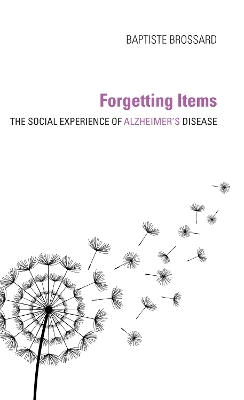
Forgetting Items
The Social Experience of Alzheimer's Disease
Seiten
2019
Indiana University Press (Verlag)
978-0-253-04496-9 (ISBN)
Indiana University Press (Verlag)
978-0-253-04496-9 (ISBN)
This book proposes a critique of mainstream ethics in dementia care. It provides a new way of understanding dementia by viewing it, not solely through a medical lens, but also as a social experience.
The book provides an immersive, person-focused exploration of the disease through interviews and observational excerpts.
Alzheimer's disease has not only profound medical consequences for the individual experiencing it but a life-changing impact on those around them. From the moment a person is suspected to be suffering from Alzheimer's or another form of dementia, the interactions they encounter progressively change. Forgetting Items focuses on that social experience of Alzheimer's, delineating the ways disease symptoms manifest and are understood through the interactions between patients and the people around them. Mapping out those interactions takes readers through the offices of geriatricians, into patients' narratives and interviews with caregivers, down the corridors of nursing homes, and into the discourses shaping public policies and media coverage. Revealing the everyday experience of Alzheimer's helps us better understand the depth of its impact and points us toward more knowledgeable, holistic ways to help treat the disease.
The book provides an immersive, person-focused exploration of the disease through interviews and observational excerpts.
Alzheimer's disease has not only profound medical consequences for the individual experiencing it but a life-changing impact on those around them. From the moment a person is suspected to be suffering from Alzheimer's or another form of dementia, the interactions they encounter progressively change. Forgetting Items focuses on that social experience of Alzheimer's, delineating the ways disease symptoms manifest and are understood through the interactions between patients and the people around them. Mapping out those interactions takes readers through the offices of geriatricians, into patients' narratives and interviews with caregivers, down the corridors of nursing homes, and into the discourses shaping public policies and media coverage. Revealing the everyday experience of Alzheimer's helps us better understand the depth of its impact and points us toward more knowledgeable, holistic ways to help treat the disease.
Baptiste Brossard is a French sociologist and Lecturer at the Australian National University. He is author of Why Do We Hurt Ourselves?: Understanding Self-Harm in Social Life.
Acknowledgments
Introduction
Chapter One: The Organization of Repairing Exchanges
Chapter Two: Losing Credibility
Chapter Three: The Deference Industry
Chapter Four: Reconstituting People
Conclusion
Notes
| Erscheinungsdatum | 10.12.2018 |
|---|---|
| Verlagsort | Bloomington, IN |
| Sprache | englisch |
| Maße | 140 x 216 mm |
| Themenwelt | Sachbuch/Ratgeber ► Gesundheit / Leben / Psychologie ► Krankheiten / Heilverfahren |
| Medizin / Pharmazie ► Medizinische Fachgebiete ► Geriatrie | |
| ISBN-10 | 0-253-04496-0 / 0253044960 |
| ISBN-13 | 978-0-253-04496-9 / 9780253044969 |
| Zustand | Neuware |
| Haben Sie eine Frage zum Produkt? |
Mehr entdecken
aus dem Bereich
aus dem Bereich
wie Frauen mit AD(H)S erfolgreich, selbstbewusst und stabil leben …
Buch | Softcover (2024)
Kösel (Verlag)
18,00 €
ganzheitlich verstehen und behandeln - Ein Ratgeber
Buch | Softcover (2023)
Kohlhammer (Verlag)
28,00 €
Geschichten gegen Angst und Stress
Buch | Softcover (2024)
Hogrefe Verlag
12,95 €


